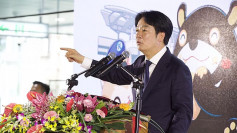Beijing rebuked Washington's latest signals of trade war de-escalation on Thursday, dismissing reports of progress as "fake news" and insisting that the U.S. must fully dismantle its unilateral tariffs before any negotiations can begin. The rejection came just a day after President Donald Trump hinted at sharply reducing his administration's 145% tariff on Chinese goods.
"The US should respond to rational voices in the international community and within its own borders and thoroughly remove all unilateral tariffs imposed on China, if it really wants to solve the problem," said Chinese Commerce Ministry spokesperson He Yadong in a briefing in Beijing. "Reports on development in talks are groundless."
Chinese Foreign Ministry spokesperson Guo Jiakun echoed that sentiment, telling reporters that any notion of active talks was false. "To my knowledge, China and the United States have not engaged in any consultations or negotiations on the tariff issue, let alone reached any agreement," Guo said.
Trump had told reporters on Wednesday: "Maybe we'll make a special deal, and we'll see what it will be. Right now, [the tariffs are] 145%, that's very high." He added the rate would "come down substantially," though "it won't be zero."
Treasury Secretary Scott Bessent reinforced that ambiguity, saying the administration had made no formal tariff reduction offer. "No one thinks the current status quo is sustainable... I would posit that over the very near future, there will be a de-escalation. We have an embargo now on both sides," Bessent said during remarks at the International Monetary Fund.
However, Beijing's response has been unequivocal. Chinese experts advising the government characterized Trump's statements as political maneuvering to calm markets and address rising domestic pressure amid recession fears. "He's getting a bit flustered now," said Wang Yiwei, director at Renmin University's Institute of International Affairs. "But China doesn't buy into his talk about tariffs."
The trade war has become a top political issue for Trump, especially after meetings this week with CEOs from Walmart, Target, Home Depot, and Lowe's, who expressed concern about the economic damage and market instability the tariffs have caused.
Meanwhile, Chinese social media erupted in nationalist ridicule, mocking Trump's shift in tone. The hashtag "Trump chickened out" topped Weibo trends with over 150 million views. "If the so-called reciprocal tariffs aren't even canceled-don't bother negotiating with them!" one user wrote.
Despite the government's defiance, internal dissent has surfaced. A researcher at the Chinese Academy of Social Sciences criticized Beijing's retaliatory tariffs as counterproductive, warning they could worsen unemployment and social unrest. The post was later censored.
China's official GDP growth target of 5% is already under strain. While exports rose 12.4% in March year-over-year, analysts, including Goldman Sachs, warned the current U.S. tariffs will "significantly weigh" on the economy in coming quarters.






